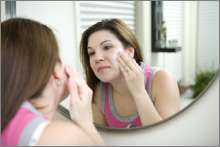How Adults (and Teenagers!) Can Avoid Acne and Pimples
by www.SixWise.com
Acne is often thought of as one of the rites of passage of
being a teenager -- one that, fortunately, you get to grow
out of. Yet, acne does not always disappear once you reach
your 20s and beyond.
|

Having acne as an adult can lead to feelings of embarrassment,
shame and lack of self-esteem.
|
"Despite the fact that adult acne tends to be generally
milder than teenage acne, this common medical condition can
have a significant impact on a person's overall quality of
life -- regardless of when it occurs," said dermatologist
Julie C. Harper, MD, FAAD, associate professor of dermatology
at the University of Alabama in Birmingham.
Harper and colleagues conducted a study to find out just
how common acne is among adults. After surveying over 1,000
people aged 20 years and older, they found that:
-
During their 20s, 51 percent of women and 43 percent
of men reported experiencing acne.
-
During their 30s, 35 percent of women and 20 percent
of men reported experiencing acne.
-
During their 40s, 26 percent of women and 12 percent
of men reported experiencing acne.
-
During their 50s or older, 15 percent of women and 7
percent of men reported experiencing acne.
What Causes Adult Acne?
Acne that doesn't disappear by your 20s is known as persistent
acne. This usually results in deep-seated, inflamed pimples
and nodules that may not respond to the treatments that worked
during your teen years.
Regardless of age, acne occurs when excess sebum (an oil
produced by your body to moisturize your skin), skin cells,
and bacteria accumulate. In adults, this can be triggered
by:
-
Hormones: Particularly during menstruation, pregnancy
and menopause.
-
Certain medications: Anticonvulsants, corticosteroids,
sobriety drugs and certain birth control pills (those
that contain only progestins) may cause acne.
-
Family history of acne
-
Stress: When you're under stress, your body produces
more androgens (a type of hormone). These hormones stimulate
the oil glands in your skin, which can lead to acne.
-
Personal care products: Oily lotions, sunscreens
or hair products can cause acne.
|

To keep acne at bay, wash your face twice a day using
a mild cleanser, but be careful not to rub too hard
(this can irritate your skin).
|
How to Avoid Acne
Acne can seem to take on a will of its own, flaring up when
you least expect it (or want it). However, these tips can
help to keep acne at bay:
1. Wash your face twice a day, gently with a mild facial
cleanser. This will remove excess oil and dead skin cells.
2. Don't scrub your skin vigorously, as this can cause irritation
that makes acne worse.
3. Use only natural
skin care and hair care products. Look for water-based
products labeled "non-comedogenic" or "non-acnegenic."
4. Resist the habit of touching your face. This transfers
extra bacteria onto your skin. (Also be careful of objects
that touch your face, such as a phone receiver or hat.)
|
Soothe Problem Skin with Vermont
Soap Organics

All Vermont Country Soaps are handmade from a hypoallergenic,
organic vegetable base using safe, non-toxic ingredients.
These soap bars are of facial quality, with different
blends for different skin types.
- Butter Bar ... best dry skin bar
- Citrus Sunrise ... all skin types
- Honey ... gentle exfoliant for combination skin
- Lemongrass ... all skin types
- Oatmeal Lavender ... dry skin
- Oats & Aloe ... unscented for dry sensitive
skin
- Peppermint Magic ... oily/combination skin
- Woodspice ... natural deodorant bar
Order
Vermont Soap
Organics Now!
|
5. Change your pillowcases often, at least once a week. This
helps prevent oils and bacteria from accumulating and rubbing
on your skin at night.
6. Women, don't go to sleep with your makeup on, as this
can clog your pores and contribute to acne. Also make sure
that you clean your cosmetic brushes and applicators regularly
with soap and water to avoid spreading bacteria.
7. Shower after exercise or other work that makes you sweat.
The sweat can trap bacteria and dirt on your skin.
8. If you already have acne, over-the-counter acne products
that contain benzoyl peroxide or salicylic acid may help.
Products that contain tea tree oil may also help clear up
acne.
9. Don't pick or squeeze any existing blemishes, as this
can cause infection or scarring.
There are also many rumors out there about foods and acne,
such as that chocolate or pizza causes acne. There is still
much debate on the topic of whether food can cause acne, but
it turns out there may be a link between diet and acne after
all. Here is what the research says:
-
In the Nurse's Study II, researchers analyzed teenage
diet and acne in tens of thousands of women, and an association
between milk intake and acne was found. The researchers
suggested that hormones and other bioactive molecules
in the milk may be to blame. This means that if you have
trouble with acne, you may want to drink only organic
milk, which does not have added hormones.
-
Vitamins A and E are important for healthy skin. In one
study, people who had lower blood levels of these vitamins
had more severe acne.
-
Eating a lot of refined carbs may also lead to acne,
because this increases the production of insulin-like
growth factor (IGF-1). Too much IGF-1 can lead to the
production of too many skin cells called keratinocytes,
which is associated with acne.
-
To keep your skin healthy, drinking plenty of water,
and making sure you're getting enough omega-3 fatty acids,
is also important.
Finally, the importance of keeping stress in your life under
control to avoid acne cannot be ignored. Acne is well-known
to flare up during times of stress, so learning some simple
stress management tools may help your skin to stay healthy.
Recommended Reading
The
Top 10 Skin Allergens, Top 8 Respiratory Allergens & Top
8 Digestive Allergens
Why
Your Face Ages, and How to Avoid Premature Aging
Sources
Science
Daily October 20, 2007
The
American Academy of Dermatology
MayoClinic.com
The
World's Healthiest Foods